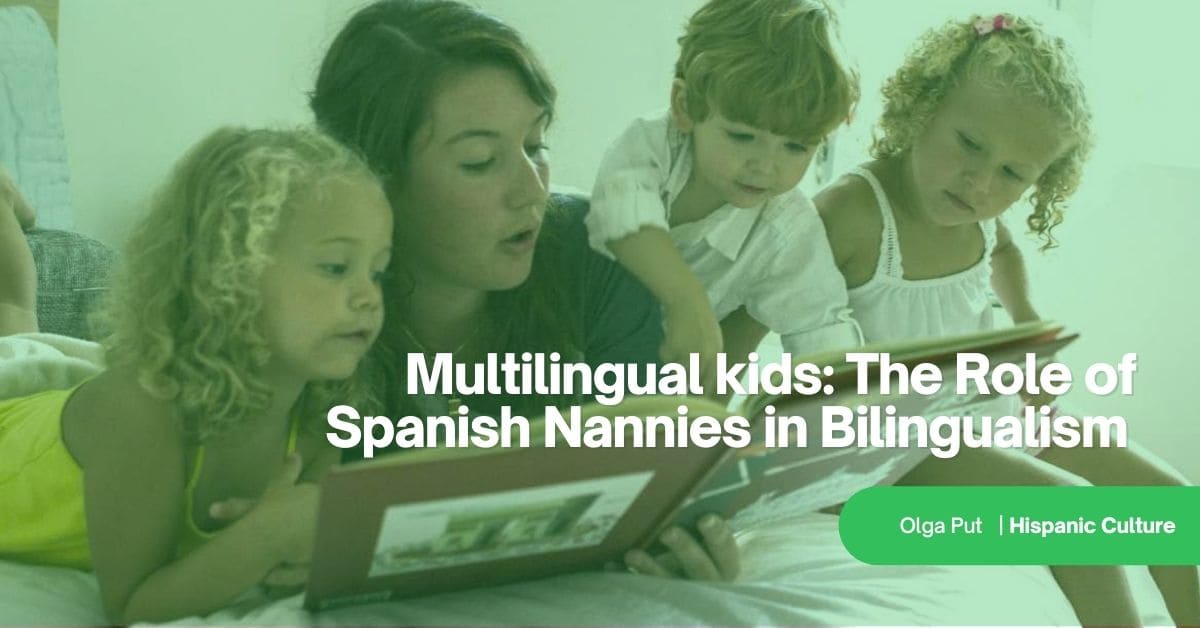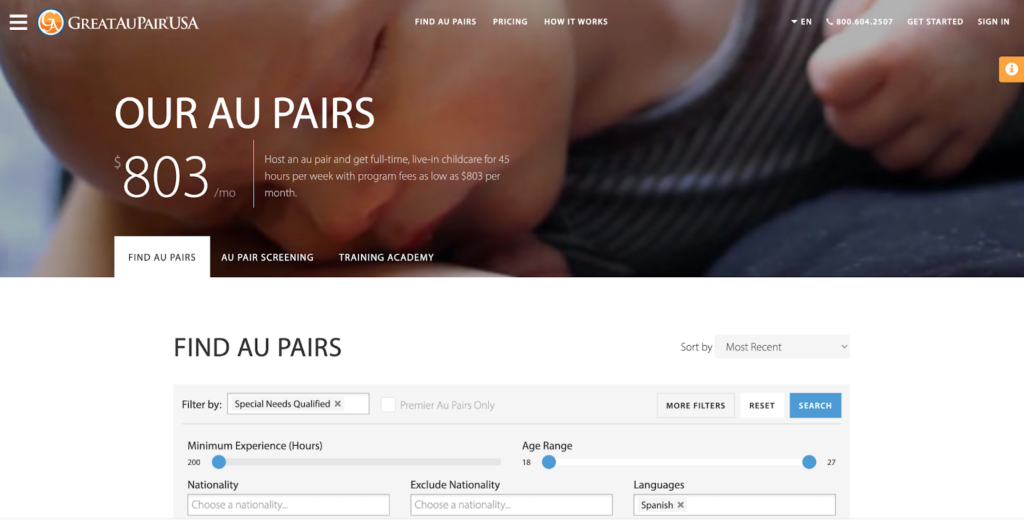
Raising Multilingual Kids: Spanish Nannies Promoting Bilingualism
I remember ten years ago when a friend was trying to bring a Spanish nanny from Bolivia for his Polish child.
His decision seemed at least peculiar to me, as nobody in his household spoke Spanish.
He was talking to me about investing in his child’s future and giving him a language spoken by millions, and I couldn’t see how visionary his determination was.
His efforts proved right, and his teenage son is now studying high school in Spain.
My friend already knew that hiring Spanish nannies for his kids would have long-term benefits due to their infant bilingual development. It also promotes future cross-culture connections.
Who doesn’t want their child to grow up a well-rounded, empathetic individual, able to connect with people?
In monolingual households, it’s easiest to expose your children to different cultures and languages by hiring a Spanish-speaking nanny or au pair.
Today I’ll explain to you why and how to do it.
Join me!
Join 559 million people on the planet who speak Spanish!
Sign up for your free trial Spanish class today. ➡️

Benefits of Bilingualism and Multiculturalism
Bilingualism and multiculturalism have numerous cognitive and social benefits for children. These benefits are only amplified if bilingual development is initiated in early childhood.
It’s now universally acknowledged that babies exposed to multiple languages are more adept at learning new languages later in life, more likely to excel academically, and better natural communicators.
Learning another language transforms how children think.
Bilingualism increases cognitive abilities, creativity, and problem-solving abilities. In addition, bilingual language exposition from early years can improve your child’s behavior.
Bilingual upbringing helps your child develop a more global perspective and fosters empathy and understanding toward people who may look or speak differently than they do.
Your child will be better equipped to navigate cross-cultural situations and may even have better career prospects in the future.
Globalization is an irresistible trend, and intercommunication among nations is a must in the professional world.
Why Hiring Spanish Nannies Is a Brilliant Idea?
Hiring a Spanish-speaking nanny or an au pair is an excellent way to expose your child to other cultures and languages.
It is also an excellent idea for language exposure when you homeschool Spanish as a non-native speaker.
Your child will practice foreign language skills and get a unique cultural experience that cannot be achieved in a typical language class setting.
Having Spanish nannies care for your child provides positive associations and memories and will develop an appreciation for another culture in the future.
It may inspire your child to learn more about the language and history of the nanny’s home country.

Spanish nannies help your child get a head start in numerous stages of language acquisition and set them up for future success.
Taking an AP Spanish class will be easier for your child if Spanish has become almost a mother tongue due to the time and exposure to the language in their childhood.
Your kid is more likely to become fluent in Spanish later in life as essential brain connections have been established in infancy effortlessly during playtime.
A Spanish-Speaking Nanny or an AU Pair?
Regarding language exposure for your child, it doesn’t matter if your family chooses a nanny or an au pair.
Still, it’s important to understand their differences to choose the option that best aligns with your family’s needs and expectations.
Not everybody feels comfortable with a foreigner living in their house and will be happy with a few hours of service a week.
The main differences between a Spanish-speaking nanny and an au pair may lie in payment, living arrangements, schedules, and duration of stay.
A nanny is a professional caregiver employed by a family with set working hours and responsibilities. They may have formal education training in early childhood development and work full-time or part-time in your house.
An au pair is usually a young person who comes to a foreign country through a program, lives with a host family and provides childcare services in exchange for room, board, and a small stipend.
The family usually also pays for language classes.
A Spanish-speaking nanny or au pair will help raise a bilingual child in a monolingual household.
Also, the preference for one or the other depends on your family’s needs.
Where to Find Spanish Nannies and AU Pairs?
Not all Spanish-speaking nannies and au pairs are equal.
You’re choosing a person that will spend a significant amount of time with your child and will influence their behavior and life approach.
Take your time in finding the best person for your family’s needs.
You can do your search and screening through various channels to make sure you find your ideal Spanish nanny or au pair.
1. Nanny Agencies
Just google “Spanish Agencies in…” and you’ll find specialized recruitment agencies in your area that can connect you with professional, Spanish-speaking nannies.
The advantage of working with an agency is that they’re the ones who conduct thorough screenings, background checks, and interviews, saving you time.
2. Cultural Exchange Programs
This option works best to connect your family with a Spanish-speaking au pair.
Check online platforms such as AuPairWorld, and GreatAuPair.com to choose your ideal caregiver.
Similar to nanny agencies, these platforms also provide profiles, reviews, and background checks, making it easier to find a qualified candidate that meets your requirements.

3. Local Communities
You may also look for local, bilingual communities, such as cultural or language-specific groups.
You may check out at the local church or community cultural center or check Facebook pages like “Mexicans in …” to find Spanish-speaking nannies or au pairs.
4. Language Schools
Go to a local language school where foreigners come to learn English.
They may have connections with Spanish speakers who could be students or graduates of language programs looking for work opportunities.
5. Personal Networks
Word-of-mouth recommendations from friends, family, or colleagues can also be a valuable way of finding Spanish nannies.
Just ask around, and you may be surprised to find out that you’re not alone in wanting to have your child exposed to other languages.
Personal recommendations will give you insight into the nanny’s personality, work ethic, and other factors that matter in the selection process.
Ready to Look For Spanish Nannies?
Do you feel ready to start your search for a Spanish nanny or au pair for your child and embrace bilingual upbringing beyond borders?
Enhanced cognitive development, cross-cultural understanding, and better work prospects should convince a parent who truly cares about their child’s future.
Regular exposure to Spanish with foreign caregivers will also help you bring up a well-rounded individual capable of connecting with people from around the world.
Take advantage of this opportunity to give your child even more Spanish exposure and strengthen their language learning journey.
Sign up for a free trial class at Homeschool Spanish Academy and try native, authentic Spanish instruction and a first-rate, expert curriculum.
Unlock the benefits of bilingualism for your child’s future success!
Remember, the earlier, the better!

Join one of the 40,000 classes that we teach each month and you can experience results like these…

“This is the best way for your kid to learn Spanish. It’s one-on-one, taught by native Spanish speakers, and uses a curriculum.”
– Sharon K, Parent of 3

“It’s a great way to learn Spanish, from native Spanish speakers in a 1-on-1 environment. It’s been fairly easy to schedule classes around my daughter’s other classes. The best value for us has been ordering multiple classes at a time. All the instructors have been great!”
– Cindy D, Parent of 3

“HSA offers very affordable, quality, one on one classes with a native speaker. My son has greatly benefited from taking classes. We have seen his confidence increase as well as his pronunciation improve, because he learns from a native Spanish speaker. HSA has quick, personal customer service. Our family has been very pleased with our experience so far!”
– Erica P. Parent of 1
Want more Spanish resources? Check these out!
- How You Can Encourage Your Child To Speak Spanish at Home
- Keep Your Spanish Skills Sharp Over Summer Vacation
- Discover the Joy of Learning Spanish with Summer Fun Activities
- 7 Powerful Reasons Why Bilingualism in Children MattersPowerful Reasons Why Bilingualism in Children Matters
- Fall En Español: Exploring Autumn Activities for Kids
- Fun and Language: Spanish Playdates for Kids
- Milestone Moments: Tracking Kids’ Spanish Progress
- Building Blocks: Kid-Friendly Spanish Grammar
- The Ultimate Guide to the Differences Between ‘Pero’ and ‘Sino’ in Spanish - December 26, 2024
- Common Irregular Informal Commands in Spanish - November 29, 2024
- Dialect vs Accent: Is It a Language, Dialect, or Accent? - November 14, 2024






